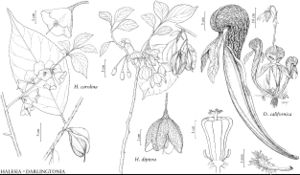Darlingtonia
Smithsonian Contr. Knowl. 6(4): 4, plate 12. 1853, name conserved ,.
Herbs colonial, stoloniferous; rhizomes horizontal. Pitchers persistent, erect, monomorphic, twisted through 90–270°, yellowish green, often suffused with red, distally enlarging into globose head, firm, surfaces glabrous; orifice round, facing ground, not covered by hood; hood arising adaxially on rim of orifice, pendulous, fishtail-shaped, flattened or slightly twisted, 2-lobed, lobes widely divergent laterally from pitcher axis, yellowish green to reddish, base narrowed to neck, apex acute to rounded. Phyllodia absent. Scapes 1, slightly longer to much longer than pitchers; bracts usually 9, alternate along scape, clasping, erect or spreading, lanceolate, apex acute. Flowers odorless; sepals persistent, lance-ovate to oblanceolate, margins entire, apex acute; petals deciduous, touching, forming curtain surrounding stamens and pistil, pendulous, ovate, each notched beyond middle (distally) so that indentations of adjacent petals align forming 5 holes in corolla, margins entire, apex acuminate; stamens 15, distinct; filaments uniform in length; anthers basifixed; ovary turbinate, shallowly 10-lobed, apex depressed; style terminal, arising from depressed apex of ovary, terminating in 5 radially diverging, filiform arms covered with stigmatic cells laterally. Capsules obconic, finely tuberculate, acropetally dehiscent. Seeds ca. 1000, long-clavate, not keeled, long-papillate. x = 15.
Distribution
nw North America.
Discussion
Chrysamphora Greene
Species 1: nw North America.
Species 1
